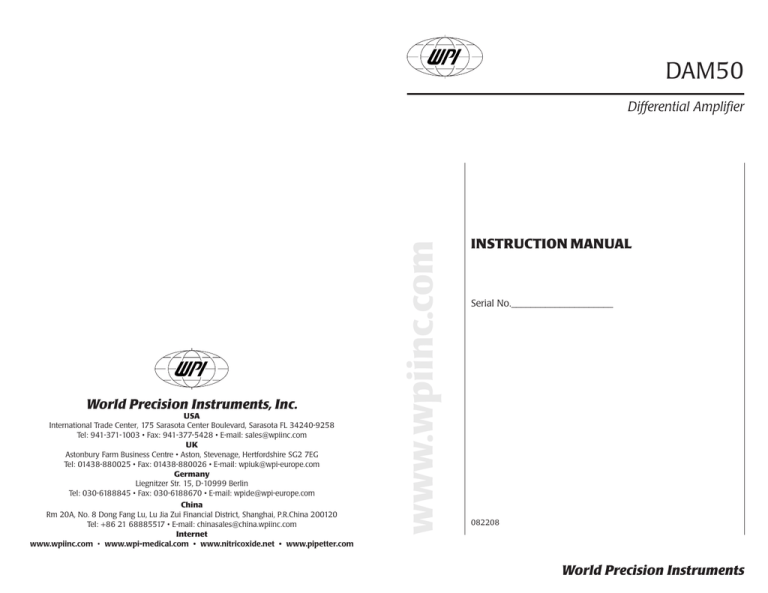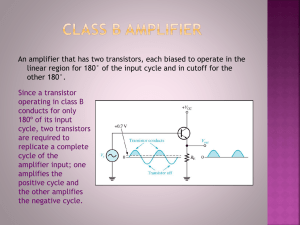
DAM50
World Precision Instruments, Inc.
USA
International Trade Center, 175 Sarasota Center Boulevard, Sarasota FL 34240-9258
Tel: 941-371-1003 • Fax: 941-377-5428 • E-mail: sales@wpiinc.com
UK
Astonbury Farm Business Centre • Aston, Stevenage, Hertfordshire SG2 7EG
Tel: 01438-880025 • Fax: 01438-880026 • E-mail: wpiuk@wpi-europe.com
Germany
Liegnitzer Str. 15, D-10999 Berlin
Tel: 030-6188845 • Fax: 030-6188670 • E-mail: wpide@wpi-europe.com
China
Rm 20A, No. 8 Dong Fang Lu, Lu Jia Zui Financial District, Shanghai, P.R.China 200120
Tel: +86 21 68885517 • E-mail: chinasales@china.wpiinc.com
Internet
www.wpiinc.com • www.wpi-medical.com • www.nitricoxide.net • www.pipetter.com
www.wpiinc.com
Differential Amplifier
INSTRUCTION MANUAL
Serial No._____________________
082208
World Precision Instruments
DAM50 Differential Amplifier
WORLD PRECISION INSTRUMENTS
7
DAM50 Differential Amplifier
Contents
Differential Amplification......................................................................................................1
The Amplifier ...........................................................................................................................2
Electrode Impedance .............................................................................................................2
Filters..........................................................................................................................................2
Testing the Amplifier ..............................................................................................................3
AC or DC recording? ..............................................................................................................3
Batteries ....................................................................................................................................3
Specifications ...........................................................................................................................4
Warranty ...................................................................................................................................5
Copyright © 2002 by World Precision Instruments, Inc. All rights reserved. No part of this publication
may be reproduced or translated into any language, in any form, without prior written permission of
World Precision Instruments, Inc.
6
WORLD PRECISION INSTRUMENTS
DAM50 Differential Amplifier
Warranty
WPI (World Precision Instruments, Inc.) warrants to the original purchaser that this equipment, including its
components and parts, shall be free from defects in material and workmanship for a period of one year* from the
date of receipt. WPI’s obligation under this warranty shall be limited to repair or replacement, at WPI’s option, of
the equipment or defective components or parts upon receipt thereof f.o.b. WPI, Sarasota, Florida U.S.A. Return of
a repaired instrument shall be f.o.b. Sarasota.
The above warranty is contingent upon normal usage and does not cover products which have been modified
without WPI’s approval or which have been subjected to unusual physical or electrical stress or on which the
original identification marks have been removed or altered. The above warranty will not apply if adjustment,
repair or parts replacement is required because of accident, neglect, misuse, failure of electric power, air
conditioning, humidity control, or causes other than normal and ordinary usage.
To the extent that any of its equipment is furnished by a manufacturer other than WPI, the foregoing warranty
shall be applicable only to the extent of the warranty furnished by such other manufacturer. This warranty will not
apply to appearance terms, such as knobs, handles, dials or the like.
WPI makes no warranty of any kind, express or implied or statutory, including without limitation any warranties
of merchantability and/or fitness for a particular purpose. WPI shall not be liable for any damages, whether direct,
indirect, special or consequential arising from a failure of this product to operate in the manner desired by the
user. WPI shall not be liable for any damage to data or property that may be caused directly or indirectly by use
of this product.
Claims and Returns
• Inspect all shipments upon receipt. Missing cartons or obvious damage to cartons should be noted on the
delivery receipt before signing. Concealed loss or damage should be reported at once to the carrier and an
inspection requested. All claims for shortage or damage must be made within 10 days after receipt of shipment.
Claims for lost shipments must be made within 30 days of invoice or other notification of shipment. Please save
damaged or pilfered cartons until claim settles. In some instances, photographic documentation may be required.
Some items are time sensitive; WPI assumes no extended warranty or any liability for use beyond the date
specified on the container.
• WPI cannot be held responsible for items damaged in shipment en route to us. Please enclose merchandise in its
original shipping container to avoid damage from handling. We recommend that you insure merchandise when
shipping. The customer is responsible for paying shipping expenses including adequate insurance on all items
returned.
• Do not return any goods to WPI without obtaining prior approval and instructions (RMA#) from our returns
department. Goods returned unauthorized or by collect freight may be refused. The RMA# must be clearly
displayed on the outside of the box, or the package will not be accepted. Please contact the RMA department for
a request form.
• Goods returned for repair must be reasonably clean and free of hazardous materials.
• A handling fee is charged for goods returned for exchange or credit. This fee may add up to 25% of the sale
price depending on the condition of the item. Goods ordered in error are also subject to the handling fee.
• Equipment which was built as a special order cannot be returned.
• Always refer to the RMA# when contacting WPI to obtain a status of your returned item.
• For any other issues regarding a claim or return, please contact the RMA department.
Warning: This equipment is not designed or intended for use on humans.
* Electrodes, batteries and other consumable parts are warranted for 30 days only from the date on which the
customer receives these items.
WORLD PRECISION INSTRUMENTS
5
DAM50 Differential Amplifier
Specifications
Input Resistance ..............................................................>1012 Ohms, common mode and
differential
Input Leakage Current ...................................................50 picoamperes, max.
Amplification....................................................................100×, 1000×, 10,000× (AC)
.................................................................................10×, 100×, 1000× (DC)
Common Mode Rejection Ratio (CMRR) ..................100 dB typ. @ 50/60 Hz,
.................................................................................80 dB typ. @ 1 KHz
Equivalent Noise Signal Input (ENSI) .......................
AC amplifier (typ.) ...........................................................0.4 µV rms (2.0 µV p/p), 0.1-100 Hz
.................................................................................2.0 µV rms (10 µVp/p), 1 Hz-10 kHz
DC Amplifier.....................................................................6.0 µV rms (30 µV p/p), 3-10 kHz
Bandwidth Filter Settings .............................................
AC
.................................................................................low frequency 0.1, 1, 10, 300 Hz AC
and DC ..............................................................................high frequency 100 Hz, 1, 3, 10 KHz
Output Voltage Swing ...................................................± 8 volts
Output Resistance...........................................................470 Ohms
Battery Test.. .....................................................................1 second audible tone
Calibrator Signal .............................................................10 Hz square wave, amplitude 100
.................................................................................microvolts (at 1000× and 10,000×),
1 mV (at 100×) and 10× DC).
Power .................................................................................2 nine-volt alkaline batteries, supplied
Input Cables .....................................................................2 miniature flat strip cables with
.................................................................................connectors are provided.
Differential Amplification
Differential amplification is of great importance in bioelectric recording to reduce the
ever present effect of noise interference from power line induction. A well designed
differential amplifier will significantly diminish power line (mains) noise. It is most
essential that the preparation be connected with an electrode to a good electrical
ground as well as to the grounding wire of the DAM50 itself. This should have the effect
of greatly reducing electrostatically induced potential. In addition to the preparation
ground, two differential input connections must be made via appropriate electrodes
applied to the recording site so as to optimally record a bioelectric potential difference.
4
WORLD PRECISION INSTRUMENTS
WORLD PRECISION INSTRUMENTS
1
DAM50 Differential Amplifier
The Amplifier
#3517 Cable
INPUT to the DAM50 amplifier is made via a flexible, flat, 4-wire
cable terminated in a miniature telephone-style plug. Individual
wires can easily be peeled from the cable strip and attached by
the user to the style of electrode best suited to the particular
application. The length of the cable should be cut as short as
possible to minimize shunt capacity (see discussion below).
Designation of the four wires is indicated on the mating panel
GND
A
B
GND
white
red
black green
receptacle. The INPUT SELECT switch allows the user to choose
A,B (inverting) or differential A-B. It is recommended that, while
the electrodes are being connected, amplifier inputs should be grounded with the INPUT
SELECT switch to avoid input overload which may result in excessive recovery time as
described below. Further, inputs A and -B must be connected to a ground return path.
In A-B mode, if either input is not placed on the preparation, it must be connected to
ground. Note that in A or -B INPUT SELECT modes, the input not selected is grounded
internally. The recorder or oscilloscope is connected via the cable provided to the
OUTPUT connector on the right side of the amplifier case.
Amplification is controlled by the GAIN selector switch. Note that amplification is ten
times larger in the AC mode than in the DC mode.
Electrode Impedance
If electrodes of very high impedance are used, electrostatic induction will induce
objectionably large noise signals. It may then be necessary to enclose the electrode and
cable with an electrostatic shield (keep the cable length short) or alternatively to shield
the entire recording area (The DAM80, a companion instrument in the DAM amplifier
series, is especially designed for high impedance electrode recording).
Filters
Testing the Amplifier
Instrument POWER is provided by two alkaline 9 volt batteries. Battery operation results
in lower internal noise level. Batteries can be tested by activating the BAT/CAL switch. If
a short tone is heard, the batteries are functional. Conversely if the tone is absent, the
batteries must be replaced. An additional function that the BAT/CAL switch performs
is to provide a low frequency square wave test signal which is applied to the amplifier
input. The amplitude of this signal is 100 microvolts when operating in either of the two
highest GAIN positions and 1 millivolt in the lowest GAIN position.
Mode
Gain
Cal signal
Output
DC
10×
1 mV
10 mV
DC
100×
1 mV
100 mV
DC
1000×
100 µV
100 mV
AC
100×
1 mV
100 mV
AC
1000×
1 mV
1000 mV
AC
10,000×
100 µV
1000 mV
To test the amplifier with this signal, switch the INPUT SELECT switch to GND. Press the
BAT/CAL switch. After the audible tone ceases, observe the resulting output signal on an
oscilloscope or pen recorder. The resulting wave shape will depend upon the LOW and
HIGH FILTER bandwidth settings and will appear more “flat topped” at the 0.1 Hz setting.
AC or DC recording?
It should be noted that DC recording with metal electrodes will invariably result in
excessively large galvanic potentials being applied to the amplifier’s input terminals. This
can result in overdriving the amplifier so that the POSITION control will not be able to
restore the operating baseline’s position. In this case, use Calomel or Ag-AgCl electrodes,
or use an external variable bucking potential; alternatively, resort to AC recording.
The LOW FILTER selector switch determines the lower cut off frequency when the user
is in the AC MODE. Note that at 0.1 Hz setting the amplifier may take a long time to
recover if the user inadvertently disconnects an input wire or if the input is exposed to
an excessively large artifact. This is a typical property of AC amplifiers set at very low
frequency filter settings. For fast recovery from signal overload the user is advised to
operate at the highest frequency setting of the low frequency filter consistent with the
application. Generally, slow signals such as ECG and EEG require the 0.1 Hz setting, while
nerve action potential recording allows the use of the 10 Hz LOW FILTER setting without
sacrificing signal quality.
Batteries
2
WORLD PRECISION INSTRUMENTS
WORLD PRECISION INSTRUMENTS
Changing the batteries is easily accomplished. Remove the four small screws which
secure the FRONT panel to the enclosure of the instrument. Replace the two old batteries
with fresh ones. Secure the FRONT panel to the enclosure. Turn the POWER switch ON
and press the BAT/CAL switch for the audible “battery ok” signal. Although any of the
common 9-volt transistor batteries will work well, alkaline cells are recommended for
longer life. Replace batteries annually or as needed. These batteries are available world
wide.
3

